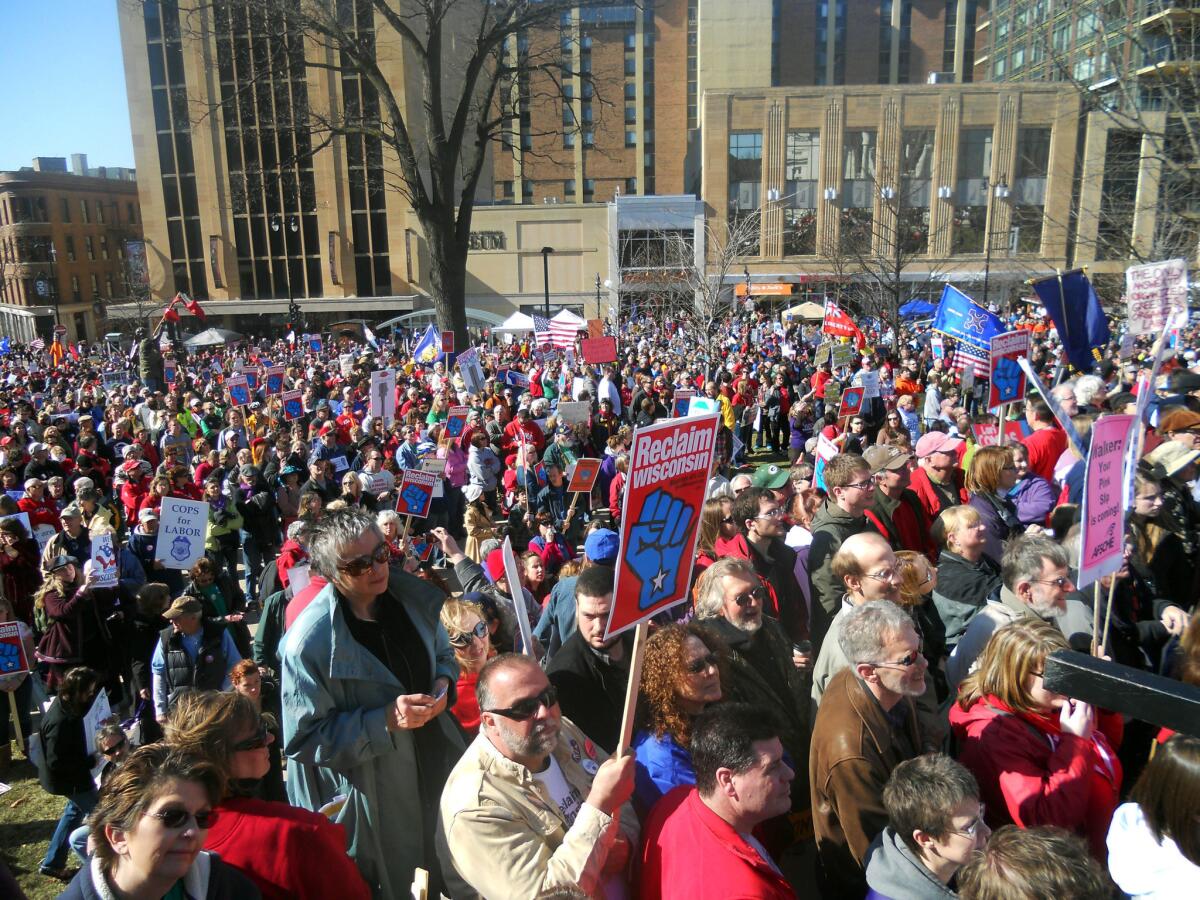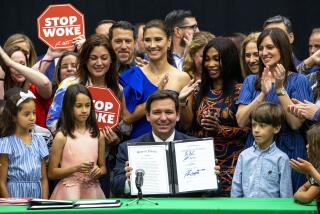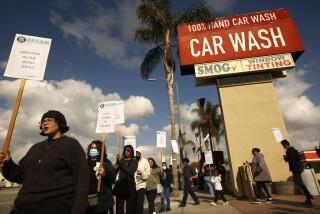A dire threat to public employees from the Supreme Court

Wisconsin unions rallied in Madison in 2012 to protest Gov. Scott Walker’s campaign against collective bargaining.
To all those who detected a shift toward progressive thinking in the Supreme Court’s rulings last week protecting the Affordable Care Act and legalizing gay marriage: You should stop celebrating now.
That’s because the court has taken up a case that poses a mortal threat to the cause of collective bargaining for public employees, amid signals that a conservative majority is poised to fire the lethal shot.
The case is Friedrichs v. California Teachers Assn. It was conjured up by right-wing anti-union activists specifically as an attack on the agency-shop provisions standard in public-employee union contracts nationwide, and was designed from its inception as an invitation to the court to overturn such arrangements. The court swallowed the bait, setting the case for argument sometime in its next term, which begins in October.
That means a decision is likely to be handed down right in the heat of the 2016 presidential campaign turning, at least in part, on issues of worker rights that are at the center of the case. As SCOTUSblog’s Lyle Denniston appropriately observed after the court agreed to hear Friedrichs, one leading GOP candidate, Wisconsin Gov. Scott Walker, has been “building his public reputation largely out of a showdown with public employee unions in his state.”
Here’s the background: Agency shop provisions stem from the 1977 Supreme Court decision in Abood v. Detroit Board of Education. Abood addressed the “free-rider” problem of public employee unions--workers who declined to join up but benefited from union bargaining on wages and working conditions.
The unions were required by law to represent all employees in negotiations, so the court held that the nonmembers could be assessed a fee tied to union expenses in negotiating and enforcing their contracts. But they couldn’t be charged for that portion of union dues associated with political activities.
Throughout the subsequent 38 years, anti-union forces have had the knives out for Abood. in California, attacks have shown up as ballot-box initiatives with some regularity. A Friedrich-style lawsuit was filed in California state court just this past April. When it comes to teachers, the subtext of these attacks is all but explicit: Teachers unions are preventing politicians and school activists from “reforming” the schools without interference from such bothersome niceties as job protection or due process for teachers.
If you hold the simplistic view that teachers are the problem with schools, then the organizations that represent most teachers are your enemy. But if you can’t take on the unions head-on, then hacking away at their income is the next best thing. Actually, if you can obtain the connivance of the courts, it’s the very best thing.
Several Supreme Court justices have signaled their willingness to entertain an assault on Abood. The leader of the cabal is Justice Samuel Alito, who devoted much of his 2014 majority opinion in Harris v. Quinn, a public employee union case, to an attack on Abood--even though that precedent ended up playing almost no part in the ultimate decision. (The court overturned agency fees for home healthcare workers in Illinois, mostly on the grounds that they weren’t really public employees.)
Writing for the 5-4 conservative bloc, Alito called the 4-decade-old precedent in Abood “questionable,” “troubling” and the product of error. He asserted that in public-employee cases, it’s just too hard to distinguish between union political activities and union collective-bargaining activities, because the latter are waged against political agencies. He seemed to think that the distinction involves huge “practical administrative problems,” although public unions and agencies have been making that distinction for more than 30 years.
In the end, however, Alito and his fellows didn’t succeed in overturning Abood, just in blocking its expansion to Illinois home health workers. But he drew a full-court pushback from Justice Elena Kagan and three other dissenters. The majority “cannot resist taking potshots at Abood,” she observed, even though “the Abood rule is deeply entrenched, and is the foundation for not tens or hundreds, but thousands of contracts...across the nation.”
She also pointed out the downside of stripping unions of their financial resources. The agency fee recognizes the special role of unions in public employee bargaining, because they must represent members and non-members equally. “It ensures that a union will receive adequate funding, notwithstanding its legally imposed disability...so that a government wishing to bargain with an exclusive representative will have a viable counterpart.”
Here’s betting that Kagan will be making the same points in the coming term.
Keep up to date with the Economy Hub. Follow @hiltzikm on Twitter, see our Facebook page, or email michael.hiltzik@latimes.com.
MORE FROM HILTZIK:
Are we really turning into a nation of Uber drivers? Not yet.
Greece, the Euro, and the banks: how a small crisis became a big one
With one ruling, Supreme Court saves Obamacare, the GOP and itself







